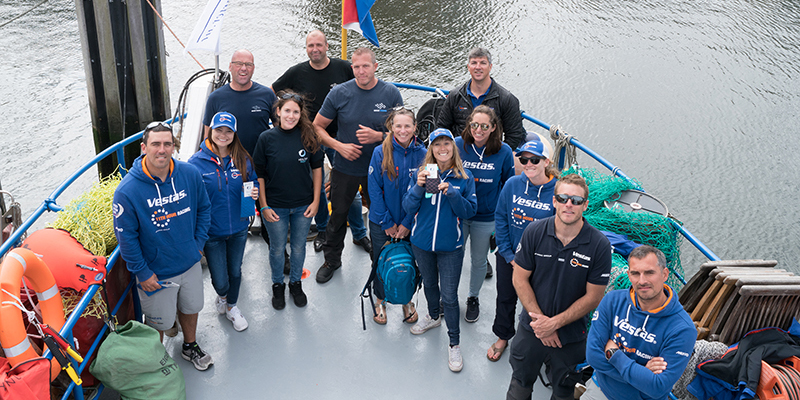
Healthy Seas is Vestas 11th Hour Racing Final Grantee
Sailors take time before heading home to learn about ‘ghost gear’ and the circular economy
At the last stopover of the 2017-18 Volvo Ocean Race, team members from Vestas 11th Hour Racing spent the morning on a dive vessel meeting with staff and volunteers of Healthy Seas, an environmental initiative that removes marine litter from the oceans and seas, with a focus on derelict fishing nets, so-called ‘ghost gear’, that harm marine life.
The grant provided by 11th Hour Racing to Healthy Seas will support its ‘Journey from Waste to Wear’ initiative which recycles fishing nets into textile products and provides a showcase for the circular economy in action. In this process, the recovered fishing nets are transformed and regenerated together with other nylon waste by Aquafil into ECONYL® yarn, a high-quality raw material used to create new products, such as socks, swimwear or carpets.
This is the final and twelfth grant awarded by 11th Hour Racing during the Volvo Ocean Race, with the team choosing a local environmental issue to focus on at each host city. From sustainable seafood to water scarcity, to sea level rise, each stopover has highlighted one of the issues that threaten our oceans, and the work that is being carried out to solve these problems.
“It’s been fascinating and an honor to meet with so many different NGOs from around the world and learn about what affects their local communities,” said Mark Towill, Team Director, Vestas 11th Hour Racing. “It’s been inspiring to see how many individuals are truly passionate about improving the health of the oceans that we crossed as we’ve sailed around the globe. We are incredibly proud of the work we have accomplished as a team in raising awareness about specific environmental issues to millions of fans and followers, leveraging the high visibility of this fantastic race.”
With the help and expertise of volunteer divers from Ghost Fishing, Healthy Seas has removed 375 tons of fishing nets in five years – by extracting the nets, the divers are not only getting rid of marine debris, but they are also freeing fish and crustaceans, and preventing the death of marine mammals and sea turtles. According to UNEP and FAO reports, every year 640,000 tons of fishing gear is abandoned in the oceans. At present, the Healthy Seas initiative is operating in Europe, focusing on the North Sea, Adriatic and Mediterranean Sea, with a two-way approach: recovering ghost fishing nets from our seas, with the help of divers and salvage companies, and preventing waste fishing nets from ending up in marine ecosystems or in landfill with the help of fishermen and fish farms.
“Thanks to the generous donation from 11th Hour Racing we will be able to organize about seven diving trips which will allow us to remove approximately 2.1 tons of ghost gear from the seas. We can’t save the world alone, but by doing something good we hope to inspire others to follow,” said Veronika Mikos, Project Coordinator of Healthy Seas. “According to a recent report, by 2050 there will be more plastic in the ocean than fish. We all have to work hard against it, not to let it happen.”
Healthy Seas is an excellent example of non-profits and industry working together for the same aim: a better planet and healthier seas, while learning-by-doing and being open to new partners and creative ideas.
Even if you live miles from the coast, what you purchase can help contribute to the health of our oceans. Buying a product made from recycled material instead of virgin materials is a simple way to reduce your impact on the planet.
Header image photo credit: Damian Foxall | Vestas 11th Hour Racing